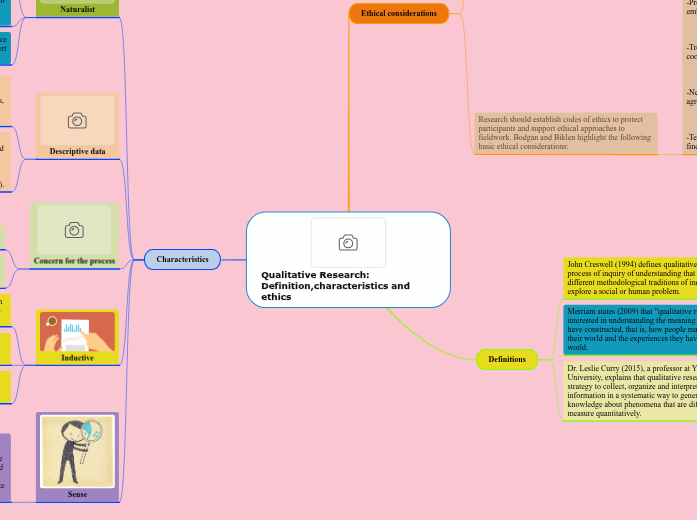
Qualitative Research: Definition,characteristics and ethics
Ethical considerations
In qualitative research, participants play a vital role and, as Hossain (2011) explains, they contribute to the analysis of the data they generate.
Research should establish codes of ethics to protect participants and support ethical approaches to fieldwork. Bodgan and Biklen highlight the following basic ethical considerations:
-Avoid research sites where participants may feel compelled to participate in research.
-Honor the privacy of the participants.
-Consider the difference in the time commitment of the participants.
-Protect the identity of the participants to avoid embarrassment or harm.
-Treat participants with respect and seek their cooperation in the investigation.
-Negotiate with the participants the terms of the agreement to carry out a study.
-Tell the truth when writing and reporting findings.
Definitions
John Creswell (1994) defines qualitative research as a process of inquiry of understanding that draws on different methodological traditions of inquiry to explore a social or human problem.
In this inquiry process, a qualitative investigation builds a complex and holistic picture, analyzes words, reports detailed insights from informants, and conducts the study in a natural setting.
Merriam states (2009) that “qualitative researchers are interested in understanding the meaning that people have constructed, that is, how people make sense of their world and the experiences they have in the world.
Dr. Leslie Curry (2015), a professor at Yale University, explains that qualitative research is a strategy to collect, organize and interpret textual information in a systematic way to generate knowledge about phenomena that are difficult to measure quantitatively.
Characteristics

Naturalist
The word naturalistic comes from ecological approaches in biology and is defined as a non-experimental approach in which subjects are studied in their natural environment.
Based on a naturalistic approach, Grady, Ale and Morris (2012) carried out a study to evaluate the impact of parental departure during the daily return to preschool on children's adaptation to daily preschool routines.
They are observed by the investigator, whose presence may be known (open observation) or unknown (covert observation).

Descriptive data
The data collected in qualitative research takes the form of words or pictures rather than numbers. The data could include interview transcripts, photographs, field notes, videos, personal documents, and other official records.
In-depth narrative descriptions were used in educational research. Some studies include The Good High School (Lightfoot, 1985), Life in Classrooms (Jackson, 1990), Teaching and Learning in an Innovative Middle School Program (2007), and The Impact of Texting on Writing Professors (Carr, 2015).

Concern for the process
Qualitative research focuses on process rather than results; so this uses multiple interactives.
This research has been particularly useful in clarifying the performance of students or teachers in the field of education.

Inductive
Qualitative research analyzes data inductively, which means that theories or concepts are built on the basis of data collection.
This approach uses a bottom-up direction to understand situations, focus on behaviors, build theories, and reach conclusions
This approach uses a bottom-up direction to understand situations, focus on behaviors, build theories, and reach conclusions.

Sense
Qualitative researchers know that meaning is an essential concern for the qualitative approach; And that is the reason why they are really interested in the perspectives of the participants (Erickson, 1986); and these perspectives focus on the assumptions that participants make about their lives and what they take for granted.
